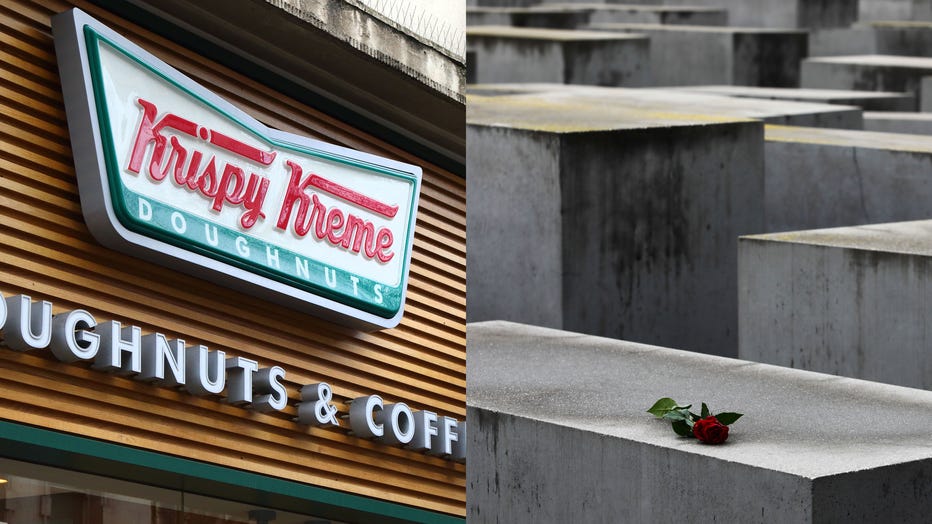Family who owns Krispy Kreme, Panera Bread to donate millions to Holocaust survivors over Nazi ties

Krispy Kreme owners to give millions to Holocaust survivors
One of Germany’s richest families is giving millions to support Holocaust survivors as it seeks to make amends for its use of forced laborers during the Nazi era.
BERLIN - One of Germany’s richest families, which owns Krispy Kreme Doughnuts, Panera Bread, Pret A Manger and other international brands, is giving millions to support Holocaust survivors as it seeks to atone for its use of forced laborers during the Nazi era and its enthusiastic support of Adolf Hitler.
In addition to 5 million euros — or $5.5 million — being given to the Conference on Jewish Material Claims Against Germany to help thousands of elderly survivors around the world, the Reimann family’s JAB Investors company plans to provide another 5 million euros to find and support forced laborers used by its predecessor under the Nazis.
An additional 25 million euros will be provided annually to Holocaust education and promoting democratic values to fight the rise of populist nationalism.

A Krispy Kreme store is shown in a file image, alongside a rose at the Holocaust Memorial in Berlin, Germany. (Photo by Keith Mayhew/SOPA Images/LightRocket & Jakub Porzycki/NurPhoto via Getty Images)
The family established the Alfred Landecker Foundation in Berlin to oversee the efforts, named after a German Jew who was killed by the Nazis and — remarkably — whose grandchildren have a combined 45% stake in JAB.
“To confront this was quite an emotional wake-up call for the family,” David Kamenetzky, board chairman of both the foundation and JAB Investors, said in a telephone interview from Washington ahead of Thursday's announcement.
The 5 million euros dedicated to the Claims Conference’s existing emergency assistance program will be distributed through some 200 welfare agencies over the next three years, said Greg Schneider, executive vice president of the conference.
“It will have a huge impact on the lives of the poorest Holocaust survivors around the world,” Schneider told the AP in a telephone interview from New York.
This year some 10,500 survivors, average age 83, were helped through short-term financial crises by the program in 34 countries. The additional funding will allow for increased payments, or some 3,000 more survivors to receive assistance, with the Claims Conference and partner agencies taking on the administrative costs themselves.
The announcement comes after the Reimann family earlier this year released initial details from a report it had commissioned on its own Nazi past.
Luxembourg-based JAB, worth some 20 billion euros, grew out of Benckiser, an industrial chemicals company run by Albert Reimann Sr. and Albert Reimann Jr., Nazi party members who died in 1954 and 1984 respectively.
Today, in addition to Krispy Kreme Doughnuts, Panera Bread and Pret a Manger, the conglomerate has controlling stakes in the Dr. Pepper Snapple Group, Keurig Green Mountain, Peet's Coffee & Tea, Caribou Coffee Co. and other companies.
Immediately after World War II, Reimann Sr. and Jr. were investigated by the occupying Allied powers and initially banned by the French from continuing their business activities. The judgment was then overturned by the Americans.
Neither talked about the Nazi era, according to the family, but after coming across documents they had kept, the younger generation began to ask questions and commissioned a University of Munich historian in 2014 to examine the family's past more thoroughly.
He uncovered documents in Germany, France and the U.S. that revealed Albert Reimann Sr. and Albert Reimann Jr. used Russian civilians and French POWs as forced laborers, and were early supporters of the Nazi party, including donating to the paramilitary SS even before Hitler came to power.
Researchers have so far identified 838 people who were forced to work for Benckiser during the war, Kamenetzky said. None were Jewish or were sent to Benckiser as slave laborers from concentration camps.
Efforts are underway to locate those who might still be alive, not only to offer financial assistance but also to ask them to talk about their experiences, he said.
“We have a commitment to look into the history,” Kamenetzky said.
That history also includes Alfred Landecker, a Jewish German World War I veteran who was killed by the Nazis, likely either in the Sobibor or Belzec death camp.
In a remarkable twist, Albert Reimann Jr. — a Nazi — ended up having three children with Emilie Landecker, the daughter of Alfred Landecker, whose Catholic wife died in 1928.
Landecker had all three of his children baptized Catholic, and by the time the Gestapo came for him in 1942 Emilie Landecker was already working as a clerk for Reimann Jr. — the same man who in 1937 wrote a letter personally to SS leader Heinrich Himmler declaring “we are a purely Aryan family business.”
Emilie Landecker continued to work for the company after the war. Though it’s not clear when she and Reimann Jr. started their affair, they had their first child together in 1951, followed by two more. Reimann Jr., who had no children with his wife, adopted all three in 1965. Two of them are now among four shareholders in JAB Investors. The third is uninvolved.
With an eye on the events that led to the killing of their grandfather and 6 million other Jews, the annual 25 million euro funding through the foundation will focus on programs aimed at fighting anti-Semitism, protecting minorities, and strengthening democracies against populism and nationalism.
The family named the foundation after Alfred Landecker, both as a tribute to him and to ensure the focus was not on JAB Investors or the Benckiser company, Kamenetzky said.
“Of everything that came out of this, the 10 million, the 25 million, the most important thing is the naming," he said. "The naming is a true statement.”

